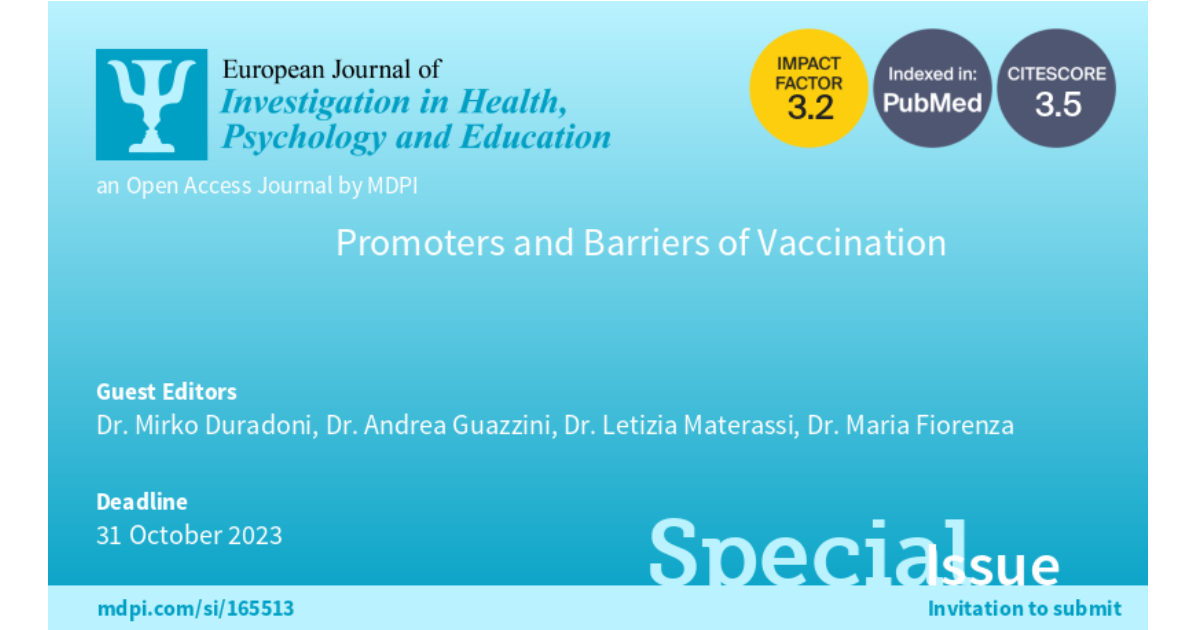Promoters and Barriers of Vaccination
A special issue of European Journal of Investigation in Health, Psychology and Education (ISSN 2254-9625).
Deadline for manuscript submissions: closed (31 October 2023) | Viewed by 12391

Special Issue Editors
Interests: readiness to change; pro-environmental behaviors; connectedness to nature
Special Issues, Collections and Topics in MDPI journals
Interests: social psychology; social cognition; cognitive psychology; participation; sense of community; psychology of virtual environment; sociophysics; complex systems
Special Issues, Collections and Topics in MDPI journals
Interests: public sector communication; public sector organizations’ changes; digital and social media processes
Special Issues, Collections and Topics in MDPI journals
Special Issue Information
Dear Colleagues,
The COVID-19 pandemic has generated an explosion of interest in the vaccination topic. Four years after patient zero, it is time to integrate the evidence that has emerged on the complex phenomenon of vaccination. The Special Issue aims to identify and model the factors that promote and inhibit vaccination (not only related to COVID-19) in a multidisciplinary way, including social, psychological, educational, health and experiential factors (e.g., contagion, development of long COVID syndrome).
Dr. Mirko Duradoni
Dr. Andrea Guazzini
Dr. Letizia Materassi
Dr. Maria Fiorenza
Guest Editors
Manuscript Submission Information
Manuscripts should be submitted online at www.mdpi.com by registering and logging in to this website. Once you are registered, click here to go to the submission form. Manuscripts can be submitted until the deadline. All submissions that pass pre-check are peer-reviewed. Accepted papers will be published continuously in the journal (as soon as accepted) and will be listed together on the special issue website. Research articles, review articles as well as short communications are invited. For planned papers, a title and short abstract (about 250 words) can be sent to the Editorial Office for assessment.
Submitted manuscripts should not have been published previously, nor be under consideration for publication elsewhere (except conference proceedings papers). All manuscripts are thoroughly refereed through a single-blind peer-review process. A guide for authors and other relevant information for submission of manuscripts is available on the Instructions for Authors page. European Journal of Investigation in Health, Psychology and Education is an international peer-reviewed open access monthly journal published by MDPI.
Please visit the Instructions for Authors page before submitting a manuscript. The Article Processing Charge (APC) for publication in this open access journal is 1600 CHF (Swiss Francs). Submitted papers should be well formatted and use good English. Authors may use MDPI's English editing service prior to publication or during author revisions.
Keywords
- COVID-19 pandemic
- SARS-CoV-2
- COVID-19 vaccines
- vaccination services
- COVID-19 vaccine acceptance and hesitancy
- global health
- mental health
- coping
Benefits of Publishing in a Special Issue
- Ease of navigation: Grouping papers by topic helps scholars navigate broad scope journals more efficiently.
- Greater discoverability: Special Issues support the reach and impact of scientific research. Articles in Special Issues are more discoverable and cited more frequently.
- Expansion of research network: Special Issues facilitate connections among authors, fostering scientific collaborations.
- External promotion: Articles in Special Issues are often promoted through the journal's social media, increasing their visibility.
- Reprint: MDPI Books provides the opportunity to republish successful Special Issues in book format, both online and in print.
Further information on MDPI's Special Issue policies can be found here.









